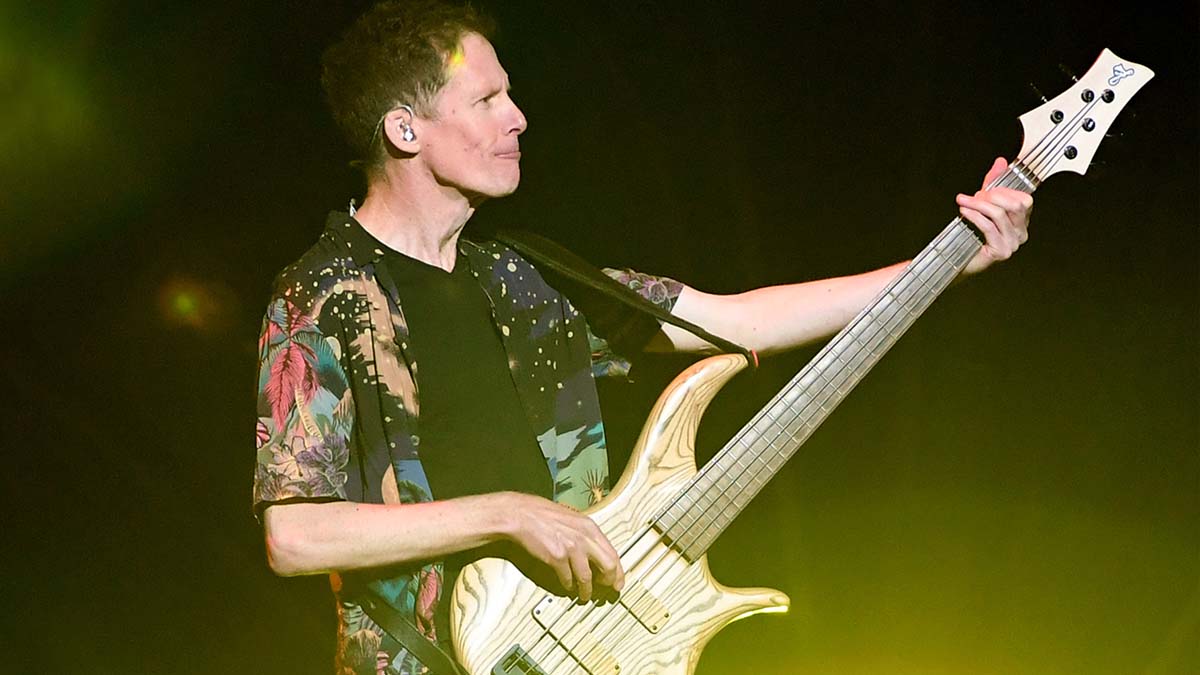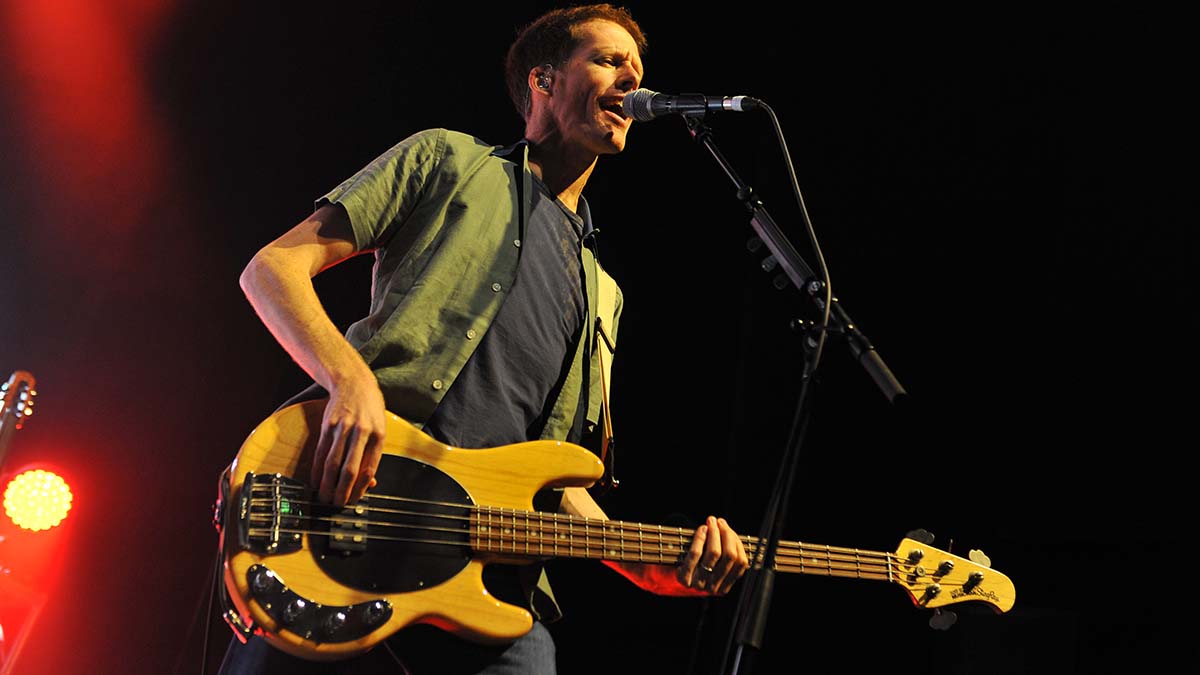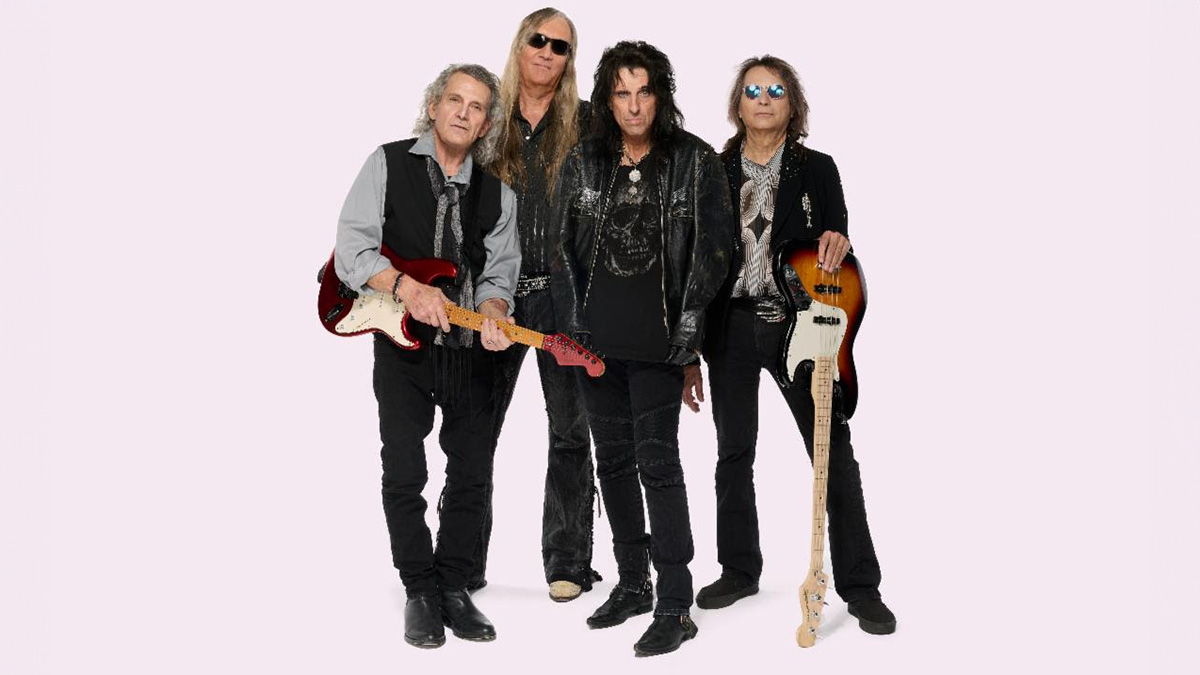Barenaked Ladies' Jim Creeggan: “Geddy Lee was the first guy I was air-bassing to… and his gear is on our new record”
The bass player for the Canadian rock stalwarts on transitioning from standup bass, longevity, and the benevolence of rock's favorite bass player, Rush's Geddy Lee

You’ll know the Toronto quartet Barenaked Ladies, formed in 1988, for hits such as If I Had $1,000,000, One Week, Pinch Me, and the theme to The Big Bang Theory, all of which have helped them shift 15 million albums, win eight Juno Awards and become members of the Canadian Music Hall of Fame in 2018.
Bassist Jim Creeggan usually drives the music with instantly identifiable double bass tones, although he also plays electric bass guitar on occasion, and he’s joined as always by Ed Robertson (vocals, guitar), Kevin Hearn (keyboards, guitar), and Tyler Stewart (drums) on their shimmering new album, Detour De Force.
The producer is Mark Howard – of Bob Dylan, Tom Waits and The Tragically Hip fame – and guests include Creeggan’s brother Andy, their former keyboard player, and bassist Fernando Saunders. Meanwhile, a certain renowned Canadian bassist lent Creeggan some gear... Any guesses who?
Jim, your new album sounds really fresh – not like a band that’s been doing it for several decades.
“Yeah! I’m really excited about it. It has that catchy element. Some of our best writing is like slowly carving a big stone down to the shape that we really want to talk about. That’s how I like to think of it.”
Or like that giant chunk of meat in a kebab shop that gradually gets smaller as they cut bits off it?
“That’s it. Our music is just a kebab. It’s been in the shop a long time. Maybe it’s been there too long. Does it attract flies? Is this a good idea? Am I gonna be okay? That’s a great metaphor.”
Get The Pick Newsletter
All the latest guitar news, interviews, lessons, reviews, deals and more, direct to your inbox!
As always, you sound like you’re having fun on bass, with lots of space to move.
“Yeah, yeah, that’s right. Every song seemed to bring out a new thing for bass, you know. I actually surprised myself. For example, I never really learned how to play with a pick over the years, but there’s a song here that needed that kind of dynamic.
“We were struggling with this song, because we didn’t know how to really do it. We did about three different versions of it, and I was just like, ‘I need to go Peter Hook on this.’ I liked Joy Division when I was in high school, and I knew that sound, so I just followed the melody.”
Do you know Hooky?
“About three years ago we were in England and we played a show with him – it was great.”
What’s the split between upright bass and bass guitar on the record?
“Most of it is double bass, and it was really interesting, because we did the majority of the songs all in one room. Mark Howard puts the console right in the middle of the studio. I used my pickup system on the double bass because there would be too much bleed with the drums if I had a mic on it, but we also experimented with a Hofner violin bass, plugged right into the board. Sometimes you need that real sustain up top, and Howard was asking me to play more melodic, too.”
When did you start to add electric bass guitar to your band’s music?
“Around 2000, though I played electric bass before that. We were recording the Maroon album, and they said, ‘Hey, we’re just wondering – what do you think about playing electric bass? It sits nicely on top of the bass drum.’ I was like, ‘Well, I’m a double bass player, you know?’”

Surely it’s easier to move from the double bass to the electric than the other way round?
“It’s a little easier, but then there’s all the other nuances about electric bass that I’m still discovering now. Anyway, first I played Fenders, but my Jazz got stolen on the way to Japan from Australia, right out of the shipping container. They left the actual case!
“I also played a Gibson Recording bass: I love that big sound, and I can really lay into it. I eventually got a 1962 Fender Precision, which was so beautiful, and then I bought an F Bass for my son, because he wanted to learn to slap, so I thought I should get him a bass that is great for that style.
“I played that on the new record as well, and that’s really become my main stage bass. It’s so well done. They’ll put an ash core in it, and then add alder wings, so you get that resonance, but you still get the bounce. With fingerstyle, that bass is just so clear and responsive. My sound man was like, ‘Can you get any more of those basses?’”
So all this is part of your transition from playing solely upright bass to playing both instruments.
“Yeah. I was playing through a piezo pickup on the double bass for years, and I work that sound hard. If it’s not there, I’ll push it till it gets there, so I really played hard all those years. Now, I’m definitely backing up a little, because I’m 51 now and I can’t do that forever.
“I use a lighter touch with an active bass, so I don’t choke the notes as much. I’ve always struggled with that. But I’ve had great people to help me. Eden amps, Sadowsky, F Bass, David Gage, D’Addario – all those guys have been so cool to me over the years.”
When you tour, do you take a double bass and an electric bass?
“Yeah, but for a while – because of the flights and the shipping and stuff – I took a Ned Steinberger NS Design standup bass with me. That’s been great. I practice on that bass all the time, because you can have the action very low, so you can spend more time in thumb position [ie holding down a string with your thumb] and you can get to where you need to be without getting exhausted in 20 minutes.”
Don’t purist double bass players regard those instruments as cheating a little bit?
“I am fully cheating and I don’t give a shit! [laughs] Because you know what happens? What happens is, you try to play credibly in thumb position, but if you’re tired, you can’t practice that. But yeah, I know what the world is like. Maybe it’s time for everybody to just go, ‘Hey, I just want to know what notes to play.’”
They never will. Everybody seems to think that everything that everyone else does is wrong.
“Exactly, and I think those things come out of insecurity. We, as bass players, are supportive players, and because of that supportive role, we rarely have a chance to explore more melodically. Sometimes we just go, ‘Well, I’m a bass player. This is the way I do it. I’ve made sacrifices to be here.’ But you know what? To be a musician, you’ve got to open up your mind. You’ve got to try some stuff. That will make your bass playing better.”
Which bass players influenced you?
“I admired the jazz players like Paul Chambers, mainly. Edgar Meyer was a great inspiration for me, because he had a real wide breadth of feeling in his playing, which I think comes with classical. He also played bluegrass and stuff, which was great.
“But Geddy Lee was the first guy that I was air-bassing to, before I even played bass, you know. Actually, Geddy’s gear is on this record. We asked him if we could use his Taurus pedals, and he was generous enough to give them to us. On the song Big Back Yard I’m actually playing his pedals and playing bass at the same time.”
He’s a remarkably nice guy.
“Yeah – he was very generous to us when we were coming up as young players. Rush gave us a bottle of champagne when we sold out this big concert venue in Toronto, Massey Hall. You know, here’s Rush giving us a bottle of wine, saying, ‘Way to go!’ And Geddy inducted us into the Canadian Hall Of Fame. He didn’t have to do that, but he really cares.
“I remember watching him play, and I noticed that he threw in this little triplet. I couldn’t figure out how he did it, so I emailed him and he got back right away, saying ‘I hold my hand like this, and sometimes that triplet happens, and sometimes it doesn’t!’ That was so cool to hear.”
- Detour De Force is out now via Wea Int’L
Bass Player is the world’s most comprehensive, trusted and insightful bass publication for passionate bassists and active musicians of all ages. Whatever your ability, BP has the interviews, reviews and lessons that will make you a better bass player. We go behind the scenes with bass manufacturers, ask a stellar crew of bass players for their advice, and bring you insights into pretty much every style of bass playing that exists, from reggae to jazz to metal and beyond. The gear we review ranges from the affordable to the upmarket and we maximise the opportunity to evolve our playing with the best teachers on the planet.
“When I first heard his voice in my headphones, there was that moment of, ‘My God! I’m recording with David Bowie!’” Bassist Tim Lefebvre on the making of David Bowie's Lazarus
“One of the guys said, ‘Joni, there’s this weird bass player in Florida, you’d probably like him’”: How Joni Mitchell formed an unlikely partnership with Jaco Pastorius





![[from left] George Harrison with his Gretsch Country Gentleman, Norman Harris of Norman's Rare Guitars holds a gold-top Les Paul, John Fogerty with his legendary 1969 Rickenbacker](https://cdn.mos.cms.futurecdn.net/TuH3nuhn9etqjdn5sy4ntW.jpg)





